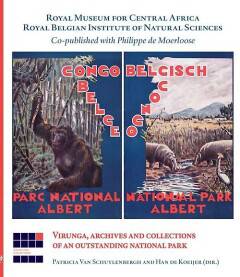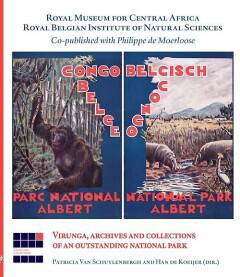
- Retrait gratuit dans votre magasin Club
- 7.000.000 titres dans notre catalogue
- Payer en toute sécurité
- Toujours un magasin près de chez vous
- Retrait gratuit dans votre magasin Club
- 7.000.0000 titres dans notre catalogue
- Payer en toute sécurité
- Toujours un magasin près de chez vous
Virunga
Archives and collections of an outsanting national park
Patricia Van Schuylenbergh, Han de Koijer (ed.)
Livre broché | Anglais
19,50 €
+ 39 points
Description
Today, and from its creation, the Virunga National Park, formerly known as the Albert National Park, is internationally renowned and recognized. The oldest national park in Africa, founded by Belgians with the support of American scientists to protect the mountain gorilla, Virunga covers a vast zone with a diversity of natural habitats sheltering exceptional flora and fauna that had to be protected come what may. For this purpose, scientific management of the park sought primarily to carry out full inventories and monitor the environment over the long term.
The collections of the Royal Museum for Central Africa and the Royal Belgian Institute of Natural Sciences conserve a significant portion of the documentary heritage amassed in the park and which recounts the fascinating and sometimes challenging human adventure behind it. Institutional archives, reports, scientific publications, photographs, maps, and above all, multidisciplinary collections from exploratory and fieldwork missions conducted until the early 1960s embody a formidable source of knowledge, from which researchers and environmental conservation managers can still reap enormous benefits today. The gradual classification and digitization of these data, available in open access, will lend maximum visibility to these sources for their many users. Meanwhile, historical research makes it possible to contextualize them with precision and grasp the issues at stake. Our two institutions preserve and enhance the value of these unique testimonials from the past, for our present and our future.
Editors
Patricia Van Schuylenbergh holds a doctorate degree in history. Head of the History and Politics scientific service at the Royal Museum for Central Africa, she specializes in Belgian colonial history, in particular the history of the environment, natural sciences, and protection and conservation of fauna in Central Africa. Virunga National Park is an important focus of her publications.
Han de Koeijer has been affiliated with the Royal Belgian Institute of Natural Sciences since 1999 as a scientific assistant and officer in charge of the Belgian Clearing House Mechanism. He is behind the CEBioS programme of the RBINS, which is involved in capacity-building within the framework of the Convention on Biological Diversity in developing countries. Since 2005 he has also been responsible for digitising the archives of the Institut des Parcs nationaux du Congo belge conserved by the RBINS and available on http://www.apncb.be
The collections of the Royal Museum for Central Africa and the Royal Belgian Institute of Natural Sciences conserve a significant portion of the documentary heritage amassed in the park and which recounts the fascinating and sometimes challenging human adventure behind it. Institutional archives, reports, scientific publications, photographs, maps, and above all, multidisciplinary collections from exploratory and fieldwork missions conducted until the early 1960s embody a formidable source of knowledge, from which researchers and environmental conservation managers can still reap enormous benefits today. The gradual classification and digitization of these data, available in open access, will lend maximum visibility to these sources for their many users. Meanwhile, historical research makes it possible to contextualize them with precision and grasp the issues at stake. Our two institutions preserve and enhance the value of these unique testimonials from the past, for our present and our future.
Editors
Patricia Van Schuylenbergh holds a doctorate degree in history. Head of the History and Politics scientific service at the Royal Museum for Central Africa, she specializes in Belgian colonial history, in particular the history of the environment, natural sciences, and protection and conservation of fauna in Central Africa. Virunga National Park is an important focus of her publications.
Han de Koeijer has been affiliated with the Royal Belgian Institute of Natural Sciences since 1999 as a scientific assistant and officer in charge of the Belgian Clearing House Mechanism. He is behind the CEBioS programme of the RBINS, which is involved in capacity-building within the framework of the Convention on Biological Diversity in developing countries. Since 2005 he has also been responsible for digitising the archives of the Institut des Parcs nationaux du Congo belge conserved by the RBINS and available on http://www.apncb.be
Spécifications
Parties prenantes
- Auteur(s) :
- Editeur:
Contenu
- Nombre de pages :
- 208
- Langue:
- Anglais
Caractéristiques
- EAN:
- 9789492669063
- Date de parution :
- 20-12-17
- Format:
- Livre broché
- Dimensions :
- 155 mm x 180 mm
- Poids :
- 430 g

Les avis
Nous publions uniquement les avis qui respectent les conditions requises. Consultez nos conditions pour les avis.






